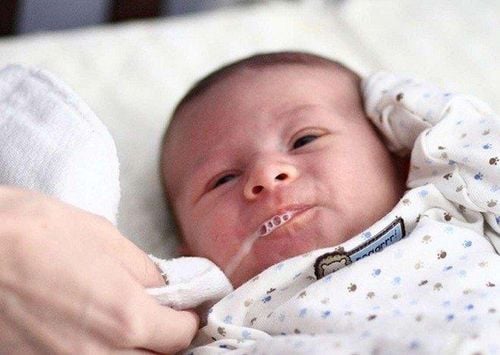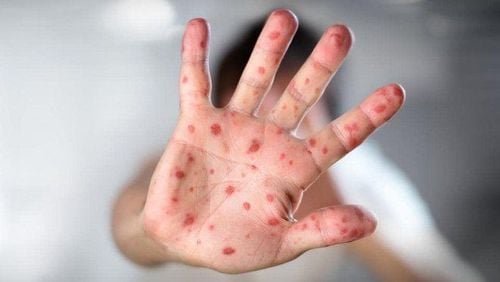This is an automatically translated article.
The article is expertly consulted by Master, Resident Doctor Dang Thi Ngoan - Pediatrician - Neonatologist - Department of Pediatrics - Neonatology - Vinmec Ha Long International Hospital.2-month-old babies always need attentive and dedicated care so that they can develop comprehensively both physically and mentally. However, this is also a time when children can develop some notable health problems, such as typhus, spitting up milk or jaundice.
1. Development of 2 months old baby
The average 2-month-old baby has an average weight of 5.1 kg and a height of 7.1 cm for girls and 5.5 kg and 58.4 cm for boys.When children are 2 months old, there are more changes than in the first months, children grow up day by day, knowing how to smile, put their hands in their mouths, express many different emotions.
At this time, children also begin to develop more emotionally and cognitively, knowing how to stop crying when being comforted and comforted. In addition, children have also begun to recognize familiar faces or voices, even startled when there is a loud noise.
When babies are 2 months old, their brains will be tightly connected and contain billions of cells. Brain cell connections will be formed every time your baby hears a voice, smells a scent, sees a face or feels a father's care, and builds a close bond between you and your baby.

2. Common health problems in 2-month-old babies
2.1 Newborn Rash A newborn rash is a red rash that appears all over the body of a baby. They usually appear within 1-2 days after birth and can disappear after a few days. However, if no definitive action is taken, this situation could return in the next few weeks.Although infant rash is often unsightly, it is not a serious health problem and may not require intervention.
In addition, the rash in infants is often accompanied by noticeable signs such as: Sudden high fever (can reach 40 degrees), after the fever subsides, there will be red rashes in areas such as the buttocks. , face, or head. The red spots are small, speckled like toothpicks. They are often uncomfortable for the baby, but do not cause itching.
Besides the above symptoms, children may experience other problems such as fatigue, irritability, lethargy, fussiness or loss of appetite. Even more seriously, the child may have swollen lymph nodes in the neck or a sore throat.
To help the child stop having a rash, parents should do the following:
Lowering a baby's fever Feed your baby liquid and easily digested foods, such as milk or porridge, and add water at the same time. adequate to help children quickly get rid of typhus Clean and keep the baby's skin dry 2.2 Seborrheic dermatitis in babies This is a common condition in babies, with manifestations such as the appearance of skin patches yellow or thick scales on the head resembling dandruff. Scaly skin may also be found on the ears, nose, eyebrows, or groin area.
Infantile seborrheic dermatitis is also known as buffalo dander , they can sometimes be confused with some other skin conditions , such as neonatal eczema . However, you can easily distinguish these two conditions because usually seborrheic dermatitis in babies will not cause itching, while newborn eczema can make your baby feel itchy and uncomfortable all the time.
The main cause of seborrheic dermatitis in newborns is due to the seborrheic hormones in the hair follicles and oil glands that are passed from mother to baby before birth. Another agent may originate from the fungus malassezia, which grows and develops mainly in sebum and some other bacteria.
This disease is not a serious health problem in infants, and should clear up on its own by the time the child is 1 year old. Parents can treat their baby at home through the following steps:
Gently rub a small amount of baby oil or mineral oil on the scaly area of the scalp Leave the oil on for about 1 hour Then wash clean baby's head Use a soft brush to gently remove scabs on baby's head. 2.3 Glasses of milk in babies Some babies may vomit milk or spit up soon after feeding. However, mothers should not worry too much about this if the baby is not vomiting a lot of milk and is still healthy or gaining weight steadily.
To improve this situation, pat your baby on the back until the baby stops spitting up milk. Alternatively, you can also keep your baby upright for 20-30 minutes after feeding.
Actually, spitting up milk is not the same as vomiting. Vomiting is often more intense and is most likely a sign of an underlying health problem in the child. Furthermore, vomiting can cause rapid dehydration in infants, which, if left untreated, can lead to serious health consequences.

In the case of infants, stuffy nose can make it difficult for the baby to breathe or make it difficult to suckle. To solve this problem, you can refer to the following method:
Put 1-2 drops of salt water into the baby's nose to dissolve mucus, making it easier for the baby to sneeze. Use a mist humidifier to add moisture to your home space. However, absolutely do not let the baby come into close contact with the heat from the machine to avoid burns. When using a humidifier, you need to pay attention to cleaning and disinfecting it regularly. Because when not cleaned properly, bacteria can multiply and grow in the machine, leading to respiratory problems, illness or allergies.
For saline nasal drops for babies, mothers can completely make saline at home with the following simple recipe:
Put 2.5 ml (1/2 teaspoon) of salt in 250 ml (cup) of cooled boiled water. Store in a clean bottle with a tight-fitting lid Use solution within 24 hours only. 2.5 Newborn hiccups Hiccups are quite common in newborns, but they usually don't cause problems. seriously affect the health of children.
Hiccups may go away on their own when the baby is held, caressed, repositioned or when the baby sucks on the tip of the finger and is fed.
2.6 Jaundice in Newborns After birth, the red blood cells in the baby's blood may be overproduced. When these cells are broken down, they release bilirubin. Normally, this substance can be eliminated from the baby's body in the first days of life through bowel movements. However, when bilirubin is not eliminated, it accumulates in the body, leading to jaundice in babies.

Gathering a team of leading pediatricians: including: leading experts, with high professional qualifications (professor, associate professor, doctorate, master), rich experience, have worked at major hospitals such as Bach Mai, 108.. The doctors are all qualified. well-trained, professional, with a mind - range, understanding young psychology. Besides domestic pediatricians, the Department of Pediatrics also has the participation of foreign experts (Japan, Singapore, Australia, USA) who are always pioneers in applying the latest and most effective treatment regimens. . Comprehensive services: In the field of Pediatrics, Vinmec provides a series of continuous medical examination and treatment services from Newborn to Pediatric and Vaccine,... according to international standards to help parents take care of their baby's health from birth to childhood. Advanced techniques: Vinmec has successfully deployed many specialized techniques to make the treatment of difficult diseases in Pediatrics more effective: neurosurgery - skull surgery, stem cell transplantation blood in cancer treatment. Professional care: In addition to understanding children's psychology, Vinmec also pays special attention to the children's play space, helping them to play comfortably and get used to the hospital's environment, cooperate in treatment, improve the efficiency of medical treatment.
Please dial HOTLINE for more information or register for an appointment HERE. Download MyVinmec app to make appointments faster and to manage your bookings easily.
SEE MOREChildren often twist themselves, spit milk, have trouble sleeping at night, what to do? Vomiting and how to handle regurgitation in children Clean children's mouth to avoid thrush, milk clots














